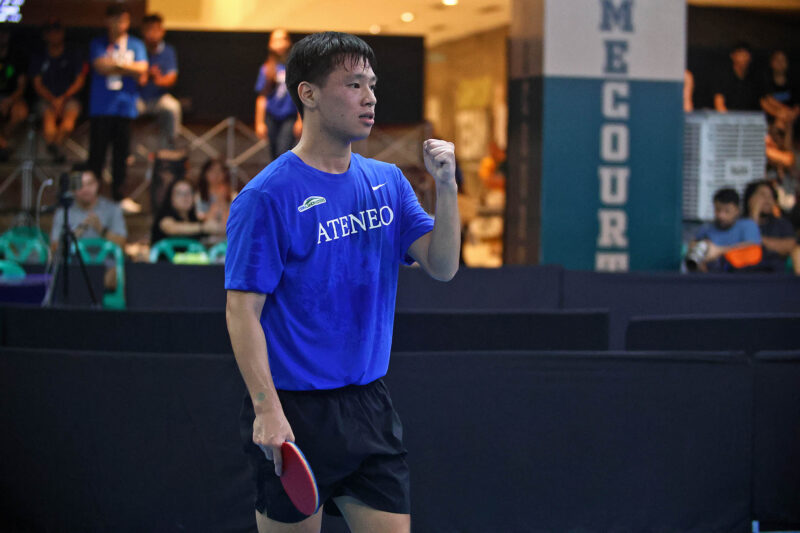THE year 2008 was a year of rallies.
In last year’s anti-Charter Change (Cha-Cha) rally held in Makati, for example, politicians from different sides of the political spectrum came together to fight against the passing of Cha-Cha by the Senate.
Meanwhile, participants of last year’s interfaith rally in Zamboanga City dedicated their advocacy to “all those victims of human rights [violations] in the Philippines.” They saw the rally as an opportunity to expose the political activists and civilians who were either abducted or executed.
But in a time of great political activity and social awareness, where is the Atenean?
While Ateneans joined various legal protests such as the Busina Para Sa Katotohanan noise barrages, Political Science Department’s home organization, The Assembly, says that fewer people attend the rallies compared to the forums, which usually have 50 to 80 participants. In the org’s December candle lighting ceremony, for instance, only 20 people participated.
“We can’t rely on mere promotions and pray to God that people will come because, let’s face it,” The Assembly President Princess Celestino (IV AB PoS) says, “political causes are not really as enticing or attractive as, say, parties arranged by the other orgs.”
The same old story
According to a 2008 PulseAsia survey conducted in the National Capital Region, 16% of the respondents are willing to support and join protests, while 84% are not. In that 84%, 63% are willing to support but not to join rallies and 31% are neither willing to support nor join them. This survey refers to the people’s willingness to participate in demonstrations that ask for the resignation of government officials linked to the ZTE Broadband deal.
Filipino journalists and sociologists usually refer to this as the “People Power Fatigue.” “I think [the term] was an attempt to describe a particular political mood,” says University of the Philippines (UP) Sociology Professor Randy David. “[It is] a mood of exhaustion and disappointment arising from the failed expectations of EDSA 2.”
He also says that after extra constitutional means of changing government, people expect that the new government would be different from the old one. “You expect such governments to be more progressive in their vision.”
After the last two People Power movements, however, these expectations did not materialize.
This feeling of “exhaustion and disappointment” is also creeping its way into the youth. While the term “exhaustion” might not apply to the youth who were not present in either EDSA 1 or EDSA 2, David sees that it is already being expressed by today’s youth.
“Kakaunti naman talaga ang nag-aattend [sa rallies] kasi tingin [nila] kaunti lang naaapektuhan sa mga issues [Only a few attend rallies because they think that only a few are affected by the issues],” says Mathematics Associate Professor Felix Muga II, Ph.D.
Turbulent times
Muga recalls the 1980’s when he himself was a student activist. At that time, the cause of protests shifted from economic and educational issues to political, especially with Ninoy Aquino’s assassination in 1983.
Ateneans then felt the same fervor, participating heavily in the social democratic wing. Along with students from state universities, they took part in what they called “the university of the streets,” boycotting classes and protesting Marcos’ control on Philippine society. Meanwhile, Psychology Professor Cristina Montiel, Ph.D. says that UP students were identified with the national democratic wing. The two sides generally criticized each other, though they shared the same sentiment against the Marcos dictatorship.
“There was an understood common ground that we were against Marcos. So it’s possible to agree on some terms and to come together on some issues,” says Montiel, who was a student activist during her college years in the Ateneo.
Decades later, the context of student activism has changed dramatically. Rags2Riches Executive Vice President Reese Fernandez (BS Mgt ’07) says student activism in the Ateneo isn’t as strong as what she observes from UP students.
“Ours is a bit more tame,” she says.
She theorizes that Ateneans fix things the Jose Rizal way, meaning through peace instead of marching in the streets.
Disempowered
For Celestino, protesting in the streets “proves to be the most viable tool to publicly and physically unite the different sectors of a society.” She also says that people shouldn’t let the EDSA spirit die down despite the government’s increasing levels of corruption.
“We must struggle to keep the fire of EDSA burning within us,” she says. “We will resort to street justice over and over until we have fully instilled fundamental and systematic reforms within the government and transformed the political culture of the country.”
For University President Fr. Bienvenido Nebres, SJ, however, the people might have grown tired of protesting, which greatly defined activism during the Marcos era. He also says that rallies become problematic when people solely depend on it for social reform.
“I think we’re addicted to rallies,” he says.
“It’s just that people are stuck with rallies as the way to change; but it hasn’t worked… If it doesn’t change the life of the poor, [then] why keep pushing things that doesn’t really work? Why don’t you find something else that works?”
For Cara*, although Ateneans are generally concerned about what is happening in the country, rallying on the streets is a different matter.
“We see if these issues are worth going to the streets for,” she says. “But we’ve seen how using the same method over and over [such as People Power] has proven to be a failure. So I guess we’re trying to think of new tactics to air our grievances.”
Meanwhile, when Political Science Professor Benjamin Tolosa, Ph.D. asked his Senior students whether they have truly become apathetic to the national situation, they said, “Sir, alam niyo, hindi [sa wala kaming pakialam]. Kundi tingin namin, kahit kami makialam, wala pa ring mangyayari (You know sir, just because we don’t get involved doesn’t mean we really don’t care. We think, however, that even if we get involved, it would not make a difference).”
This, Tolosa believes, did not necessarily mean apathy or indifference but a sign of powerlessness and disempowerment.
“You have to provide avenues where [the students] can see that they are making a difference,” he says.
“What you have is a kind of inwardness as a defense mechanism,” David says. He also says that because a person cannot control the circumstances of his life and of society, he instead turns to himself in the search for control.
With people leaving the country for greener pastures, he says people have not only lost faith in their leaders but in the government itself and its capacity to change things. David does not term it as cynicism or indifference but confusion and uncertainty.
“It is an unfortunate period in the life of our nation.”
Community-based activism
Celestino says that encouraging participation in The Assembly’s activities remains a big challenge. “We realize that people want a new venue for political participation,” she says.
While the organization still believes in rallies and forums as the “highest form of activism,” moves have been taken to encourage the use of other talents to express political beliefs. These moves include politalks [political talks], which are politically-oriented forums.
This isn’t the only case for the Ateneo. In UP, rallies aren’t the only means of political and social involvement for orgs. These include Stand UP and its affiliate, UP Praxis, which also happens to be UP Sociology Department’s home org. For Sociology Senior student and UP Praxis Finance Head Lech Baduria, that meant dialectics, which meant putting a theory into practice in order to attain another theory and practice, albeit higher.
“My parents didn’t like [rallies]. So I decided to focus more on the other side of [the] movement which is to raise consciousness through symposiums and educational discussions,” he says. Besides these talks, UP Praxis holds basic mass integration activities, which usually mean having the org members immerse themselves in picket lines and other oppressed areas.
“In our time, we were striking to destroy the dictatorship,” Montiel says. “Now, we want to make the national government work.”
She also says that changing times would mean a change in the goals to fight for–like meeting the needs of the poor. For her, rallies could work for the country, but the goal should be to improve the functioning of the current institution.
David believes that a different form of activism is starting among the youth–silent volunteerism felt at the community level.
“It is still a minority segment of the young generation…where activism is expressed in a different way. An activism of a different sort; not necessarily political, but no less [effective],” he says.
New social involvement
This volunteerism is what Tolosa sees to be the new form of social involvement. By focusing on concrete changes over intangible ones, he hopes that students would see how individual deeds can be connected to a larger frame of social and political change.
“You give them concrete things but the challenge is, in the tangible things that they do, they see that this is connected with the larger project of political change,” he says.
Despite the Office for Social Concern and Involvement’s programs to expose the students to political and social issues, Celestino says, “Most of the time, we are taught or influenced to just box each of the social issues in itself and to solve it individually as if it’s not part of one larger political truth.”
“The danger there is that political critical thinking is devalued somewhat, and that political discourse and analysis is avoided to make way for social action alone,” she says. “There should also be equally strong efforts to shape the students’ mind to think more critically and politically.”
For Nebres, true change in the society rests not just in clamoring for change in the streets, but rather in actually acting toward change, with people who share the same passions.
“You don’t move forward by worrying about your weaknesses. You move forward by building on your strengths,” says Nebres.
“We have to put our energies in things we believe will work,” Fernandez says.
“We don’t just put our energies in something that make us happy because they were able to scream and shout, but something that will really put something on the ground.”
*With reports from Frances Bea C. Cupin and Sara D. Mawis
Why some are unwilling to join protests
|
Percentage of those who will not join protests |
78% |
84% |
|
Reasons |
October 2005 |
February 2008 |
|
We need to earn for our daily expenses |
23% |
21% |
|
There are more important things to do. |
22 |
26 |
|
There’s really no change; whoever leads the government |
15 |
26 |
|
There should first be a good/credible alternative leadership |
28 |
7 |
|
We’re tired of people power |
8 |
6 |
|
Other |
2 |
4 |






